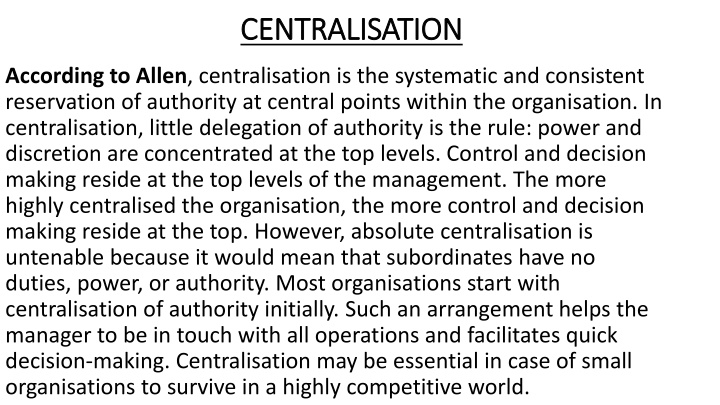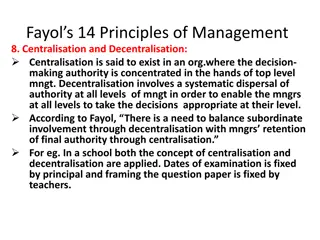
Importance of Centralisation in Organisational Decision-Making
Centralisation in organisational management involves the systematic reservation of authority at central points, facilitating personal leadership, integration, and emergency handling. It promotes uniformity of action, fosters personal leadership, and enhances decision-making efficiency, especially in times of crisis.
Download Presentation

Please find below an Image/Link to download the presentation.
The content on the website is provided AS IS for your information and personal use only. It may not be sold, licensed, or shared on other websites without obtaining consent from the author. If you encounter any issues during the download, it is possible that the publisher has removed the file from their server.
You are allowed to download the files provided on this website for personal or commercial use, subject to the condition that they are used lawfully. All files are the property of their respective owners.
The content on the website is provided AS IS for your information and personal use only. It may not be sold, licensed, or shared on other websites without obtaining consent from the author.
E N D
Presentation Transcript
CENTRALISATION CENTRALISATION According to Allen, centralisation is the systematic and consistent reservation of authority at central points within the organisation. In centralisation, little delegation of authority is the rule: power and discretion are concentrated at the top levels. Control and decision making reside at the top levels of the management. The more highly centralised the organisation, the more control and decision making reside at the top. However, absolute centralisation is untenable because it would mean that subordinates have no duties, power, or authority. Most organisations start with centralisation of authority initially. Such an arrangement helps the manager to be in touch with all operations and facilitates quick decision-making. Centralisation may be essential in case of small organisations to survive in a highly competitive world.
There are certain special circumstances forcing managers to reserve authority and centralise decision-making power: 1. To facilitate personal leadership:Centralisation generally works well in the early stages of organisational growth. Working under a talented and dynamic leader, a small firm can derive advantages in the form of quick decisions, enterprising and imaginative action, and high flexibility. Centralisation enables a small organisation to capitalise on the loyalties, ability and experience of its most talented top management people. Under this arrangement, the manager is in touch with all operations, makes all decisions, and gives all instructions. Thus, centralisation can project the personality and skills of one outstanding leader more meaningfully. 2. To provide for integration:Under centralisation, the organisation moves like one unit. It keeps all parts of the organisation moving together harmoniously towards a common goal. It assures uniformity of standards and policies among organisational units. The danger of actions drifting and getting off course is minimised. The manager acts like a unifying force and provides direction to enterprise activities. In the process, duplication of effort and activity are also avoided. To see that all units do the same thing in the same way or at the same time without wasteful activity, centralisation is essential.
3. To handle emergencies: Centralisation is highly suitable in times of emergency. The resources and information can be mobilised quickly and efficiently. Quite often, emergency situations like declining sales, introduction of a highly sophisticated competitive product, government policy changes may force the organisation to cut down costs, maintain inventories at an optimum level, utilise resources effectively and instantaneously. Centralisation of decision-making ensures prompt action necessary to meet the emergencies.
ADVANTAGES OF CENTRALISATION ADVANTAGES OF CENTRALISATION Centralisation is done with the objective of reserving decision making power in regard to planning, organising, directing and control at the top level. As such it has the following advantages: 1. Facilitates uniformity of action. Management can ensure uni- formity of action by all the functional managers through centralisation. 2. Promotes personal leadership. Centralisation promotes personal leadership. In case the size of the organisation is small or medium, its success depends upon the skill and experience of the manager. As such centralisation of authority enables the manager to take all decisions at the top level. He can also supervise and monitor the decisions taken at lower levels. He can take decisions quickly which are important for the success of an organisation. 3. Helps integration. Centralisation is necessary for unity and inte- grity of the various operations of the organisation. Unified control is necessary for the efficient and effective running of the organisation.
4. Helps in handling emergencies. Centralisation enables the manager to take quick decision to take advantage of an opportunity or to actin emergencies. In case the decision is delayed the opportunity may be lost. For example, if prices of raw materials come down, the manager may take a decision to buy the raw material at low prices quickly lest the price may rise and the advantage of purchasing raw materials at low prices be lost. 5. Economical operations. Centralisation reduces cost of operation by avoiding duplication of functional services and time saving devices. 6. Co-ordination becomes easier. Centralisation also helps in co- ordination. In fact all major decision are taken centrally, there is little or no need of co-ordination.
LIMITATIONS LIMITATIONS In spite of so many advantages centralisation also suffers from the following drawbacks : 1. Increases burden of top executives. Centralisation increases burden of the top executives as they also handle routine jobs. Therefore, they find little or no time for important work. 2. Kills initiative of lower level executives. Centralisation kills initiative of the executives at middle and lower levels. They have to follow the orders of the top level executives. As such they cannot take independent judgement. 3. Hampers diversification. Centralisation hampers diversification of products and services. Top executives due to over-busyness are reluctant to expand their area of operation and
4. Hampers growth of organisation. Centralisation also hampers growth of an organisation due to the reason discussed above vide point number three. An executive cannot efficiently and effectively manage a centralised organisation after it has reached a certain size. 5. Difficulty in communication. In centralised units decisions are taken at head office. It takes longer time and involves huge cost to communicate with units situated at far away places. Communication becomes costlier in terms of time as well as money. 6. No scope for specialisation. Centralisation does not help executives to specialise as they have to look after so many things.

